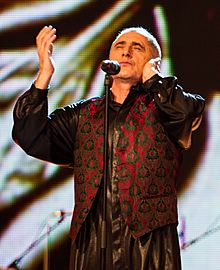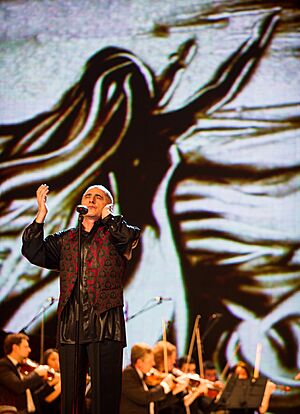Alim Qasimov facts for kids
Quick facts for kids
Alim Qasimov
|
|
|---|---|
 |
|
| Background information | |
| Born | August 14, 1957 Nabur, Shamakhi District, Azerbaijani SSR, USSR |
| Origin | Shamakhi, Azerbaijan |
| Genres | Mugham |
| Occupation(s) | Musician |
| Instruments | Singing, Daf |
| Years active | 1977–present |
Alim Hamza oghlu Qasimov (Azerbaijani: Alim Həmzə oğlu Qasımov), born on August 14, 1957, is a famous musician from Azerbaijan. He is known as one of the best singers of mugham, a special kind of traditional Azerbaijani music. In 1999, he won the International Music Council-UNESCO Music Prize, which is one of the biggest awards in the world for music.
Alim Qasimov's music is special because he often makes up parts of his songs as he sings them. This style is different from very old mugham traditions. He has recorded nine music albums. Three of these albums are mugham albums that he made with his daughter, Farghana Qasimova.
The New York Times newspaper once said that Alim Qasimov is "simply one of the greatest singers alive." They praised his amazing ability to sing with strong feelings and deep thought. In 2012, Alim Qasimov performed with another Azerbaijani singer, Sabina Babayeva, at the Eurovision Song Contest 2012 in Baku. He sang background vocals for her song "When the Music Dies" and was also part of the opening show.
Contents
Early Life and Music Journey
Alim Qasimov was born in 1957 in a village called Nabur in Shamakhi, Azerbaijan. This village is about 100 kilometers north of the capital city, Baku. His family worked on a farm, and Alim helped them from a young age. He later said that growing up without much money taught him to live simply.
Alim's father sometimes sang and had a good voice, but he never became a professional singer. However, Alim loved to sing from a very young age, and his parents noticed how much he wanted to make music. Since they didn't have money for an instrument, his father made him a simple drum from a frame and a goat's stomach lining.
Alim started singing at religious events. His parents encouraged him to study music in school. It was sometimes hard for him. Once, when he was 14, he sang in a local music contest, and the audience laughed because they thought he wasn't singing in the right traditional style. Even with these challenges, his parents told him to keep going.
When he was 21, he joined the state music school in Baku. He studied there for four years, focusing on how to use his voice and learning mugham, which is a type of classical Azerbaijani song. His teachers were so impressed that they wanted him to take his final exams two years early. But Alim said no, because he wanted more time to make his skills perfect. He realized that music was not just a hobby for him; it was something he truly needed to do. He worked hard on his singing technique and passed his final exam easily. Later, he felt that he had focused too much on just singing perfectly and that he understood the deeper feelings of mugham much later.
Musical Career

Alim Qasimov began singing professionally when Azerbaijan was still part of the Soviet Union. At that time, the government didn't support mugham music much. Performances were limited, and the ruling communist party saw it mostly as a local curiosity. However, as Alim Qasimov became more popular, the Soviet Union's power started to weaken. In 1983, he won the national Jabbar Garyaghdioghlu Singing Competition.
As his career grew, he became known around the world. He won awards at UNESCO events in 1983 and 1987. His tours were very popular both in Azerbaijan and in other countries. Since it was rare for people from the Soviet Union to travel abroad, his concerts received a lot of attention in newspapers and on television.
While his career was taking off, his personal life was also changing. Alim Qasimov and his wife, Tamilla Aslanova, had their first child, Ferghana Qasimova, in 1980. Later, they had two more children, a son named Gadir and another daughter named Dilruba. Even with these changes, Alim Qasimov's simple background continued to shape him and his music. He didn't let city life or television change his style.
Over time, Alim Qasimov's music style grew to include not only traditional Azerbaijani music and mugham but also ashiq. Ashiq is a rural storytelling and singing tradition with roots in Turkey, Azerbaijan, and parts of Iran. He was also inspired by other artists, especially the Qawwali singer Nusrat Fateh Ali Khan. Alim Qasimov said that hearing Nusrat Fateh Ali Khan helped him understand many things about music.
His success was even more impressive because he changed the traditional mugham style and added his own ideas to it. He believed this would help more people enjoy mugham and make it important for today's world. He said, "The world we live in changes every day. Music needs to show these changes. I do that by finding new ways to sing and new meanings." He also changed the instruments used in mugham, adding his own improvisation and new sounds like the balaban (a type of wind instrument), the clarinet, and the nagara (a metal drum). He also made sure his music group had a mix of older, experienced musicians and younger, energetic ones.
In the 1990s, Alim Qasimov toured widely, performing in Iran, Brazil, the United States, and many countries in Europe. His music became more known in Europe and North America after he met American musician Jeff Buckley at a music festival in France. Jeff Buckley loved Alim Qasimov's music, and they sang a song together called "What Will You Say." This performance was included on Jeff Buckley's album Live à l'Olympia. Jeff Buckley was very impressed, saying Alim Qasimov's singing was "so pure and effortless." Alim Qasimov also enjoyed working with Jeff Buckley, saying he was "very gifted." This performance helped introduce Alim Qasimov's music to more people in Western countries.
After Azerbaijan became independent from the Soviet Union, the importance of Azerbaijani culture, including Alim Qasimov and mugham, started to be recognized around the world. Alim Qasimov was named the "People's Artist of Azerbaijan" in 1993. In 1999, he received the highest honor in his field, the International IMC-UNESCO Music Prize. This award has been given to other great musicians like Dmitri Shostakovich, Leonard Bernstein, Ravi Shankar, and Nusrat Fateh Ali Khan.
Partly because of Alim Qasimov's many tours and his efforts to promote mugham, UNESCO declared the mugham of Azerbaijan a "Masterpiece of the Oral and Intangible Heritage of Humanity" in 2003. This helped make sure that this old classical tradition would be preserved. Alim Qasimov's own music was also preserved as he started recording and releasing his music internationally. This began with Classical Mugham in 1996, followed by Azerbaijan: Art of the Mugham and Legendary Art of Mugham in 1998.
In 1999, Alim Qasimov and his daughter performed in a concert called "The Spirit of the East."
Working with Ferghana
Alim Qasimov's daughter, Ferghana Qasimova, had been practicing with her father since she was 16. She was a very dedicated student of mugham. By the time she was 20, she became a talented singer herself, and Alim Qasimov decided to include her in his music group. Ferghana first appeared on the 1997 album The Legendary Art of Mugham, where they shared the singing on the song "Getme Getme."
Their next album included a song called "Bagishlamani," which was dedicated to Nusrat Fateh Ali Khan. This album was important because it was Alim Qasimov's first widely available release to Western audiences, and it was very successful. His goal to connect younger generations with mugham started to work. He was not only appealing to traditional Islamic groups in Azerbaijan but also to more modern audiences. This success among young people encouraged him. He said, "Sometimes young people come up after a concert to thank me. That's like giving me wings. I feel so happy when I can awaken such feelings in people while they are still young; mugham is not an easy type of music for young people to understand."
Alim Qasimov continued to record and release more music, including The Art of Mugham in 1997 and Central Asian Series, Vol. 6: Spiritual Music of Azerbaijan in 2007. In 2005, he performed in New York City as part of Yo-Yo Ma's Silk Road Project. This concert aimed to encourage artistic exchange between Eastern and Western cultures. The New York Times said that Alim Qasimov's performance was the best part of the event.
He toured all over Europe, now bringing Ferghana with him. They were often asked to perform at spiritual music festivals in countries like France and Egypt. Their performances were often praised by critics, no matter where they were. After a performance in London, Michael Church wrote in The Independent that people were "drawn into his intimate, multicoloured world." The father and daughter team worked very well together. After their performance in Cairo in May 2008, Al-Ahram Weekly praised their strong singing and stage presence, calling Alim Qasimov "a master of mugham."
Their mugham style was also very popular in September of that year, when they performed with the experimental classical group, the Kronos Quartet. The band leader, David Harrington, wanted to work with Alim Qasimov for the Ramadan Nights Festival. He said, "I realized his voice was as unique as Nusrat Fateh Ali Khan's... There's a special quality to that voice, a connection between it and his inner life... he is up there in the top five of all time [singers]." Even though there were some initial challenges because the Kronos Quartet had written music and Alim Qasimov liked to improvise, the event received good reviews. Robin Denselow of The Guardian newspaper said that Alim Qasimov "is certainly one of the most thrilling, unashamedly emotional performers on the planet, and the finest exponent of mugham."
In 2014, Alim Qasimov performed at the Festival Internacional Cervantino, which is the largest international festival in Latin America. In 2015, he performed at the Opening Ceremony of the First European Games in Baku. He sang the opening act and later performed again while singing from a flying carpet.
Influence and Legacy
In 2009, Alim Qasimov was included in a book called 500 most influential Muslims of world. The Icelandic singer Björk praised Alim Qasimov, calling him her "favourite singer alive today." In 2009, the Turkish newspaper Zaman called him "Central Asia's Greatest Voice." In 2010, Alim Qasimov was nominated for the United States National Public Radio's "50 great voices in recorded history" award.
Personal Life
Alim Qasimov teaches mugham at the Asaf Zeynally Music School in Baku. In 2012, he spoke out to help stop violence against women.
Discography
Albums
- Classical Mugham (1996)
- The Legendary Art of Mugham (1997) with Alim Qasimov Ensemble
- The Art of Mugham: Azerbaidjan (Live) (1997)
- The Mugham of Azerbaidjan (1999)
- Love's Deep Ocean (1999) with Farghana Qasimova
- Oyanish (2003) with Coldünya
- Central Asian Series, Vol. 6: Spiritual Music of Azerbaijan (2007) with Farghana Qasimova
- Intimate dialogue – live at Morgenland Festival Osnabrück 2009 with Farghana Qasimova
- Seven Beauties Music Project with Shoayb Shahabi (2018)
- Awakening (Buda Musique, 2019) with Michel Godard
As Featured Artist
| Year | Title | Album |
|---|---|---|
| 2010 | "I’m your Goddess" (David Vendetta feat. Tara McDonald and Alim Qasimov) | Vendetta |
| 2015 | "Gdybym" (Voo Voo feat. Alim Qasimov and Farghana Qasimova) | Dobry wieczór |
| 2018 | "Yol" (Vugarixx feat. Alim Qasimov |
See also
 In Spanish: Alim Qasimov para niños
In Spanish: Alim Qasimov para niños

